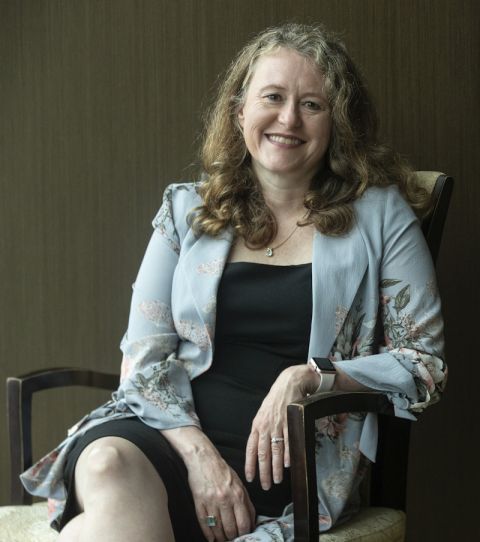
Leanne Kaufman, Law’96, RBC Royal Trust’s President and CEO since 2015, has spent over two decades guiding clients through personalized wealth management and estate planning while rising through the company’s leadership ranks. With legal professionals particularly in mind, she sat down with Queen’s Law Reports Editor Lisa Graham to share insights and advice on four topics: managing your wealth, planning your estate, planning for your digital assets, and planning a gift to charity.
Managing your wealth and planning your estate
QLR: What insights about wealth management would you like to share with legal professionals at all ages and stages to help them plan for today and their future?
Kaufman: Wealth management has become complicated in so far as the universe of investments available. It’s not necessarily simple stocks and bonds anymore; there are also alternative investments like cryptocurrency. First, make yourself financially literate. Understand what financial planning means and, for the areas where you need to focus, get advice. Legal professionals are in the advice business; we should take advice as well, and this is an area where advice matters, because investments, tax, and estate planning can get complicated.
QLR: When should one start thinking about their personal finances and developing a plan to prepare for their future?
Kaufman: As soon as you start earning income, make yourself aware of the kinds of retirement savings plans available. It’s not something that 20-somethings tend to think about, but if you put it off until you’re in your 30s or 40s, you’ve lost the magic of compound interest and probably the opportunity to get contributions from employers or other sources, government plans, etc. The choices you make in your 20s and early 30s make a big difference in your 50s, 60s, and 70s.
The amount needn’t be significant; just start getting in the habit of saving, opening registered accounts that have tax benefits, and doing the analysis. Even if you only have limited funds, determine if it would be better for you to invest them in a TFSA (Tax-Free Savings Account), an RRSP (Registered Retirement Savings Plan), or an FHSA (First Home Savings Account). Do the research, educate yourself, and get some advice.
QLR: What’s your advice to law students and recent graduates with big debts?
Kaufman: Open those plans early and contribute to them with discipline. At RBC Royal Trust, we work with David Chilton, who wrote The Wealthy Barber, the 1989 book that made “pay yourself first” popular. Lots of people credit that kind of discipline, even if it was small amounts to begin with, for their financial security and freedom 30 years later.
I’m not a financial planner by profession, but I think that paying off debt typically trumps anything else because debt is so costly and accumulates through interest over time. Find a professional who can help you. Answering a few simple questions might open doors to options you didn’t know were available.
QLR: What would you say specifically to young women?
Kaufman: We’re starting to learn a lot more about gender and ageism and the pension gap between women and men. When you’re making choices about stepping aside from your career for a time to have children, care for family members, or whatever your case may be, think about that from a financial planning perspective as well. Run the numbers with your financial professional. That may not change the choices you make, but it’s good to be aware of options. Research is finding a substantial gap in women’s pensions because being systemically underpaid, plus reducing your pensionable earnings by stepping out of the workforce, can together mean falling behind our male counterparts when it comes to our retirement income – and we’re probably going to live longer and have longer expenses.
QLR: What would you tell young people who have a company pension plan available to them but decide not to contribute to it until they’re older?
Kaufman: I think that’s a mistake. You’ll thank yourself later for making the small sacrifices early to put aside just enough money to maximize the contribution or the matching that might be available to you. Otherwise, you’re giving up free money.
QLR: What should young lawyers starting out as associates in law firms be thinking about?
Kaufman: Avoid splashing out too much. This may be the first time you’re earning real income, and, while it’s fun to have a bit of freedom and luxury, it’s easy to get highly leveraged – maybe buying more car or more house than you need. If you are not disciplined in spending less than you earn, you may regret some of those choices 20 or 30 years down the road.
QLR: What did RBC Royal Trust’s Ipsos survey results show about people in the 34 to 55 age group?
Kaufman: This gets into estate planning. Many people don’t get serious about making a will or assigning powers of attorney until there’s a life event like getting married, buying a home, or having a child. Even when they probably were past one or all those milestones, two-thirds of those surveyed in this age group didn’t have a will. You’re never too young to have a will and powers of attorney. You’re not doing it for yourself; it’s for the people you’re leaving behind. Hopefully, those documents won’t be needed in your younger years, but the mess left behind in not having them is fairly substantial to your loved ones.
As part of your estate planning, at all ages, think about who you want to name as your executor and your power(s) of attorney. These are not ceremonial, honorary positions; they are real jobs with real work and real liability that not everyone would thank you for.
QLR: When deciding who to name as their executor, many people may think the family member or friend who is a legal professional would be the best. But what should those who are asked think about?
Kaufman: First, research enough to figure out whether executing a will is something you even want to do. I think people say “yes” because it feels like an honour or an obligation. It may be a difficult conversation, but it’s better to say “no” now than to quit the situation in the future or do it begrudgingly and then feel a bit resentful. You make a good point that any lawyers in the family might be the ones people naturally turn to. It doesn’t mean they’re all experts in the estate area, and frankly they’re probably busier than others and don’t have the time because, depending on the estate’s complexity, settling it can be very, very time-consuming. Just because an estate has a low-asset value doesn’t mean it’s not complicated. Bankrupt estates, for instance, are very complicated and very time-consuming, and all estates that have any sort of tricky family dynamic require a lot of communication – also very time-consuming. This is another area where professionals can help.
QLR: What should people who are becoming their firm’s partners or senior partners in their 40s and 50s focus on?
Kaufman: There’s probably some nuanced estate planning involved in being business owners or a partner, so, depending on the structure of their business, they should make sure their executor understands what will happen to their ownership and how that flows to their beneficiaries.
Because people are living quite long, this 40s and 50s group (and some in their 60s and 70s too) may still have aging parents alive, so they might start thinking on their behalf about ways of supporting their late life, such as caregiving, home care, or life in a retirement home.
This age group is more likely to also be named as their parents’ executors, so now they’re at this super busy time in their lives, the peak of their career, and finding themselves in this role. There are resources and support for you out there. Having a parent’s or other family member’s power(s) of attorney is another role they might find themselves in when that person loses the capacity to manage their own financial, property, or medical matters. Some lawyers get named to fill this role for clients, stepping into someone’s shoes to manage their affairs while they’re still alive but unable to manage things themselves. That’s another full-time job. Do you have the time and the capacity to do that when, as a lawyer, you know about the liability associated with it?
QLR: What should concern sole practitioners and other business owners?
Kaufman: They need to have a conversation about a succession plan with their accountants, lawyers, and financial professionals. There are several questions to consider. Do they have a successor who intends to take over their practice? How do they want to transition out of their business? What if something unexpected were to happen tomorrow versus a planned succession? Those are business risks and realities, and people who get caught up in the day-to-day practice of law may not really be thinking bigger picture from a business perspective. They should be.
QLR: Is there a certain age or stage to start thinking about a business succession plan?
Kaufman: You always want to think about the what-ifs, so if you’ve started a business (including a law practice), then ideally you have some sense of what would happen if you were suddenly unable to run it temporarily or permanently. As soon as you become a business owner, you need to have a plan in place for the unlikely event that something happens to it or to you unexpectedly. It becomes more of a pressing reality when you’re thinking about an orderly transition of succession for this business, whether it’s because you’re ready to retire or because you’d like to work until the day you die. Either way, remember that the older you get, the more you have to plan for that.
 QLR: Is it a good idea to combine wealth management with estate planning?
QLR: Is it a good idea to combine wealth management with estate planning?
Kaufman: Yes, they are part of one big holistic plan, interplaying with one another. Estate planning is more than just having a will and power of attorney documents; it takes into account your wealth and your wealth accounts. If you have registered plans in your investment portfolio or on your insurance policies, do you have designated beneficiaries on them? Those designations happen outside of the will but have an impact on your estate. It’s all interconnected; you can’t really have good planning conversations in isolation, so good wealth managers will also make sure their clients are receiving good estate planning.
QLR: How does a person go about this? Where’s the place to start?
Kaufman: Find a financial planner you would like to speak with about your options. You don’t have to have a great deal of wealth to have a good planner at your disposal – someone at your bank or a trusted advisor of a friend, parent, or colleague. Also, start educating yourself by reading or watching videos about financial literacy in Canada. There are services available for people at all asset levels. There are even do-it-yourself levels of planning, online training accounts, and programs to help educate you and build a plan that replicates on a lighter level what a fully accredited financial professional would do with you.
QLR: What do you hope legal professionals will do, now that they have your advice?
Kaufman: Make a will and name a power of attorney for property and for personal care. Get some basic financial advice. Understand the difference between the pension that may be available to use through work versus registered plans. Take full advantage of any plans that are made available; you may miss out on contributions or tax deductions by simply not participating.
QLR: Anything else from your personal observations in these areas that you think is important to share with legal professionals?
Kaufman: We’re in a super-aging society. Have you financially planned to live to 100? You don’t want to plan for just the first five or 10 years after you stop working, when you expect to take five or six trips every year or go south for months. Given how much longer people are living, you must think about retirement as a whole other adult life potentially. What does the end of that look like and what do you want your family to know about the way you want to live in those later and end-of-life years? Talk to them about it. And if we still have our parents, we all need to be thinking about and talking to them about that.
Then there’s this massive intergenerational transfer of wealth coming. As the baby boomers pass on, I don’t think we can anticipate what that transition of wealth is going to look like and what the impact will be. For example, we don’t know whether there will be a housing surplus then. So watch demographics, pay attention to what’s being said, and just be curious in your reading. There’s a lot tied to this super-aging society and longevity.
Finally, I encourage lawyers to go into this area of practice because it’s just going to keep growing.
 Planning for your digital assets
Planning for your digital assets
QLR: What are digital assets and why is it important for people to account for them when planning their estate?
Kaufman: Digital assets are anything for which you’ve created an online account and which you access by entering a username and a password. Some may have monetary value, including everything from an online bank account and loyalty/rewards points to cryptocurrency or NFTs (non-fungible tokens). Some may have sentimental value, like photos that are only available in a cloud or on a drive of some kind. There is also your social media presence on the platforms you use.
Digital assets are so amorphous and difficult to give advice on because there is no set of rules globally or even nationally for example, on what happens to your account if you die or become incapacitated and on how you can give someone else access to that account. Every account or social media platform has its own rules about their process buried in the terms and conditions that you mindlessly scroll past, clicking “accept” without reading them. In many instances, you can appoint a “successor” who has the authority to either shut that account down or access it.
For any asset that you can’t go to a physical presence to access, there needs to be an account-by-account or platform-by-platform action taken.
QLR: What can happen if people don’t account for these assets?
Kaufman: To give an example, there was a U.K. case a few years ago involving a young father who passed away and had stored all the photos of him and his daughter on his Apple iCloud account. Since he had not given his wife the necessary permissions to access his account legally, she had to go to court.
An executor has to find all the assets and liabilities of a deceased person. Many of these only live in an email account or on a computer now. How many of us print and store these documents in a filing cabinet or an accordion file anymore? Even to have access to your phone, computer hard drive, or email account is both critical and often challenging for the executor to start this digital scavenger hunt.
QLR: What must people do to ensure someone else has access to their digital assets?
Kaufman: First, for each asset you’ve created that has monetary or sentimental value, educate yourself on the rules to grant someone else access to it. Next, follow those rules. Then, make sure your executor knows that each asset exists and how to access it so that the assets can be distributed to beneficiaries. It is a huge and daunting task for an executor because the rules keep changing for platforms.
QLR: Should your executor of digital assets be the executor for your entire estate, or should this be someone different, who’s maybe tech savvy?
Kaufman: That’s a great question, because the platforms don’t require it to be the executor of your general estate. We haven’t seen enough examples of this yet in real life, but I can see complications with that because the executor of your will has the overall accountability and responsibility to step into your shoes, gather all your assets, pay off your debts, and then distribute the remaining assets to your beneficiaries. If you’ve named someone else to have authority over any digital account, and they don’t communicate with the executor, how is your executor really supposed to do their job under the will?
QLR: Anything else we should know about estate planning for digital assets?
Kaufman: Just that it keeps changing and increasingly more of our assets are becoming digital. We have to pay as much attention to these assets as we do to bank accounts, real estate, and all the other assets we own.
Planning a gift to charity
QLR: What are the options for making charitable gifts in one’s will, and what are the benefits?
Kaufman: Some people don’t even consider charitable giving as part of their estate planning, though they really should if they have philanthropic intent. Death can be a big taxable event for many, and charitable giving is a great way to both give back and lessen the tax burden, as well as leave a legacy. There are lots of different ways to plan a charitable gift, so it’s a matter of personal choice once you have enough advice to understand which one is best for you. I am not a financial planner, so I will discuss the options in generic terms.
A bequest is a one-time gift upon death, paid from after-tax estate funds. It’s relatively simple, like cutting a cheque during your lifetime. It could be a fixed dollar amount, a fixed set of securities (e.g., Royal Bank shares), or a percentage or share of the estate’s residue (the amount remaining after all assets are gathered and all liabilities and other specific gifts are paid). It’s not uncommon for a percentage or a share to go to charity, even when children, grandchildren, or others are also intended to have a gift.
Considering that a deceased person is taxed as if they sold everything they owned on the day they died, the next options can be attractive during one’s lifetime, too.
With a gift of securities, the donor can avoid having to pay the capital gains tax that would be applicable if they instead sold those securities.
Naming a charity as the beneficiary of a life insurance policy creates a larger gift at a smaller cost. You don’t feel like you’re taking away estate assets from your children, grandchildren, or other beneficiaries because this policy exists outside of the will. Also, the way premiums are paid out could also be attractive.
Another option is setting up a private foundation or contributing to a public foundation (donor-advised fund). A foundation allows the funds to be distributed to one or more charities during your lifetime and then as a legacy. Depending on its set-up, the people who control the foundation may have the authority to decide which charities get gifts in any particular year or every year, and in what proportion.
When an owner sells their business and has a big capital gain on that sale, we often see them opening or contributing to a foundation that year because they can realize very significant tax savings and make a significant gift. An option is to put funds aside to enable gifting over many years through that foundation structure.
QLR: Returning to the results of RBC’s Ipsos poll on estate planning, what did you find most interesting about charitable giving?
Kaufman: The highest percentage of people who responded that they intended to make charitable giving a part of their estate planning were those aged 18-34. Maybe they don’t have children yet or maybe they’re just a more socially conscious generation that will retain that kind of charitable intent even after they’re over 50. Ironically, 70 per cent of that age group didn’t have a will, so they’re not able to implement that philanthropic intent.
 Discover ‘Estate Planning as an Act of Love’
Discover ‘Estate Planning as an Act of Love’
Leanne Kaufman, Law’96, business journalist Bruce Sellery, Com’93, and David Chilton, best-selling author of The Wealthy Barber, last February delivered “Estate Planning as an Act of Love,” an online fireside chat hosted by Queen’s University Gift Planning. In this discussion – which received the Canadian Council for Advancement of Education’s 2023 Gold Prix d’Excellence award for Best Development Event – they explored what an estate plan looks like, discussed common misconceptions, and revealed potential pitfalls to watch out for. Watch the video at https://law.queensu.ca/estate-planning
Interested in creating a legacy at Queen’s Law?
As you reflect upon your own legacy, consider an extraordinary act of generosity – leaving an estate gift to Queen's Law – to empower future generations of legal professionals. You can help shape the future of legal education by directing your gift to:
- cultivate scholarships and student financial aid to expand access to legal education;
- advance experiential learning opportunities;
- promote international study experiences; or
- champion faculty excellence in teaching and research.
Your contributions weave into Queen’s Law’s evolving tapestry, building bridges from the past to the present and future, strengthening our academic tradition. This act of forward-thinking generosity illuminates the path for tomorrow’s legal professionals, ensuring your legacy thrives within our Queen’s Law community.
Planned giving options include a bequest of monetary contributions, securities, or other property, a life insurance policy, and registered retirement funds.
Explore planned giving options at www.queensu.ca/alumni/supporting-queens/gift-planning or connect with our Gift Planning Team at 1-800-267-7837 or gift.planning@queensu.ca.
(PLEASE NOTE: RBC Royal Trust President and CEO Leanne Kaufman’s helpful guidance in this feature is not meant to replace a professional financial advisor's personalized counselling. You are strongly encouraged to consult a qualified, independent expert before implementing any of the strategies she describes.)